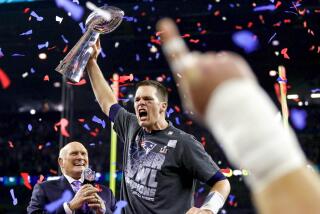SUPER BOWL XXI : DENVER vs. NEW YORK : Pro Football / Bob Oates : Nowadays, Super Bowl Foes Aren’t Even Close
- Share via
Most Super Bowl games of recent vintage have been alike in one respect. They’ve figured close and ended as blowouts.
Going in, the point spread is 3 or 4 points. Coming out, the score is 27-10 or 38-16.
This is an unlikely phenomenon. The National Football League’s two conference champions should be a better match, at least some of the time. Why aren’t they?
Two possible explanations:
--This is a passing era, in contrast with the early days of NFL title games. When a good passing team gets on a roll, it can score a lot of points quickly.
For example, last year’s Super Bowl wasn’t yet a runaway in the third quarter when the New England Patriots backed the Chicago Bears down to their goal line. There, standing in the end zone, Jim McMahon threw the ball out to midfield, connecting with Willie Gault. And the rout was on.
In former days, good running teams sometimes dominated good defenses, but they couldn’t often roll up a bunch of points.
--Psychologically, the growing importance of the Super Bowl is beginning to work on the players’ minds. When one side sees its life’s goal slipping away in a public place, before millions, the disappointment and humiliation drain it of energy.
At the same time, stirred by the nearness of an NFL championship that had seemed remote not long ago, the winning side gains confidence, energy and a sense of irreversible momentum.
Result? Blowout.
Super Bowl XXI looms as a game that could be won with trick plays. Both teams love surprises.
Giant Coach Bill Parcells played the trick of the year on the San Francisco 49ers earlier in the playoffs. On an apparent field goal try, holder Jeff Rutledge, the backup quarterback, passed instead, moving the Giants into position for the touchdown that made it 21-3 in a 49-3 game.
Just before the snap, kicker Raul Allegre went in motion, and Rutledge stood up to take the snap. The 49er kick defense team, unused to pass defense, covered Allegre but not the intended receiver, tight end Mark Bavaro.
It was Parcells’ fifth trick play this season.
Denver’s coach, Dan Reeves, has used as many as five in one game. His whole offense sometimes seems to be a trick-play offense--with halfback passes, reverses, fake reverses and even quarterback option plays, among others.
“When I was a (Dallas) halfback, I saw how effective those plays could be,” Reeves says.
Some coaches consider tricks a sign of weakness. But when they work, they deal a traumatic blow to any team.
It was the late Clark Shaughnessy, who belongs in the Hall of Fame but isn’t, who said: “Anything you do that’s different will give you the edge in football.”
If the Broncos are the weaker team this time, their trick-play offense may help even things up.
NFL coaches contend that key injuries are decisive in a long season when two or three teams seem evenly matched.
That theory apparently held up again in the NFC this season when the Giants got to the Super Bowl with only one key disabling injury, which cost them safety Terry Kinard.
With all hands on deck, the Bears, 49ers and Giants are probably the NFC’s three strongest teams--but the Bears and the 49ers both lost their quarterbacks, McMahon and Joe Montana, for much of the season.
This cost them the home-field edge in the playoffs, although the Bears had matched the Giants’ 14-2 regular-season record.
With McMahon, would the Bears have won one more game and the home-field advantage? Could Phil Simms and the Giants have beaten McMahon and the Bears in Chicago this month in a battle of injury-free teams? They didn’t last year.
Montana’s injury, requiring mid-season back surgery, also cost San Francisco the home field in the playoffs. And when he came back, Montana wasn’t the mobile tiger he used to be.
The 49ers had won Super Bowls XVI and XIX with injury-free teams.
The Bears won last year’s game with an injury-free team.
The Giants are this year’s candidate.
More to Read
Go beyond the scoreboard
Get the latest on L.A.'s teams in the daily Sports Report newsletter.
You may occasionally receive promotional content from the Los Angeles Times.










